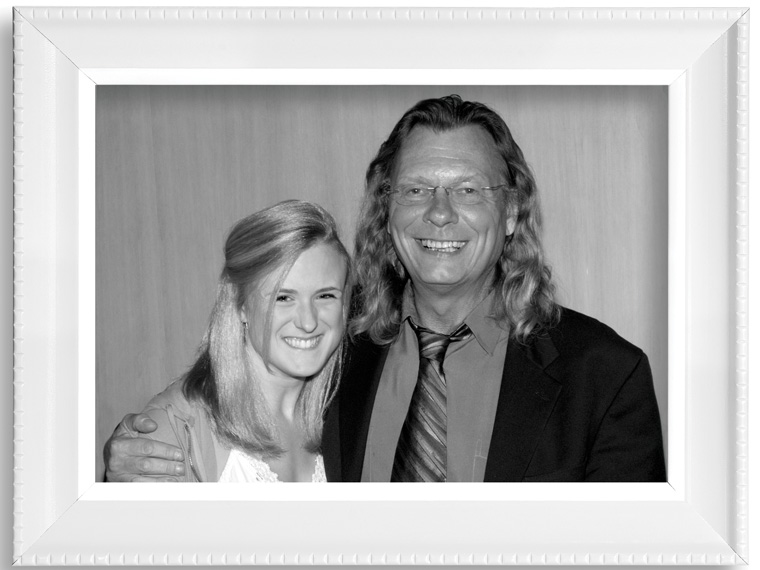Writing Faculty, 1975–2002 | Director, Graduate Program in Poetry, 1991–2002 | Co-Founder, Summer Seminar for Writers
“I will always be proud to carry in my veins his blood—full of generosity, humor, swagger, and that language-hungry fever that gave the world his poems.”—Daughter Claudia Lux ’09
Thomas Lux (December 10, 1946–February 5, 2017) would want us to move quickly past the part we’ve already heard—the part reiterated in dozens of obituaries and tributes next to handsome photos of him with that sun-streaked blond hair—the part about his 19 books of poems, the Guggenheim and NEA grants, the Kingsley Tufts Award, among others. He’d want us to move quickly past his accomplishments because he was not big-headed or proud, though he had reason to be both.
Lux became part of the Sarah Lawrence family when he joined the writing faculty in 1975. He spent more than a decade as director of the graduate program in poetry, along the way persuading his friends, former students, and other poets to join him, including Billy Collins, Mark Doty, Suzanne Gardinier, Marie Howe, Kate Knapp Johnson ’79, MFA ’81, Jeffrey McDaniel ’90, Kevin Pilkington, and Vijay Seshadri, among others. He left for Georgia Institute of Technology in 2002 without truly leaving. He returned yearly to give craft talks and master classes and to teach in the Summer Seminar for Writers, which he co-founded in 1993—and to play softball.
If he was your teacher, he insisted you call him “Tom.” He wanted you to learn the rules of writing poems so you could break them and to “read ’til your eyes bleed.” If he believed in you (and he believed in so many of us) and you needed a job, he found you a job. If you needed to get into school and no one else would let you in, he let you in. If you were drunk and about to fail out of college, he “saved your ass” and took you to AA meetings. Maybe he read your poems, “line by line, word by word.” He was the poet who taught you to be your own poet. He wanted you to know there was a place for you. Sometimes, blessedly, that place was near him.
Tom was not a religious man, but he said grace before dinner in the evening with his wife and always added his own bit: “Let us always keep in mind the needs of others.” That he did. Tom’s pedagogy, in life and in the classroom, was one “of care” and of matchless generosity. If you were fortunate to be one of his students or many good friends, you might feel you owe him your life.
“Let us always keep in mind the needs of others.”
If you didn’t know Tom, you probably knew his poems. He made you think twice before letting a tarantula drown in your pool, or at least look again at a jar of maraschino cherries resting forgotten in their “wet neon red” glory in your refrigerator. He reminded you of the thirst of turtles, to give something back to the wind, and, “of course, of course,” to love.
It doesn’t take much to imagine how he would have us live in his absence. He’d want us to “illuminate the world” with our words. He’d want us to read as many books and poems as we could get our hands on. He’d want us to share and be grateful. And he’d want us to get back to work. In the closing lines of his poem “An Horatian Notion,” he tells us:
You make the thing because you love the thing
and you love the thing because someone else loved it
enough to make you love it.
And with that your heart like a tent peg pounded
toward the earth’s core.
And with that your heart on a beam burns
through the ionosphere.
And with that you go to work.
Many thanks to the tributes delivered at Tom’s memorial at Sarah Lawrence College on May 6, 2017. Quotes in this piece are derived from those tributes and others by Miles Coon MFA ’02, Ross Gay MFA ’98, Marie Howe, Kate Knapp Johnson ’79, MFA ’81, Claudia Lux ’09, Jennifer Holley Lux, Jeffrey McDaniel ’90, Kevin Pilkington, Patrick Rosal MFA ’99, Vijay Seshadri, and Jennifer Wallace MFA ’98. Additional thanks to too many Facebook and blog posts to count. And of course, thanks to the man himself, who encouraged my work at a time when it meant the most.
Written by Katharine Reece MFA ’12
2006 Photo Courtesy of the SLC Archives
